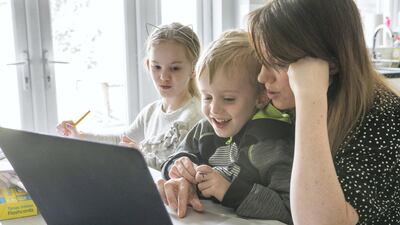With primary and secondary schools closed for the duration of England's third lockdown, working parents up and down the country are searching frantically for the best way to educate their children at home while juggling life's demands.
One advantage compared to the first lockdown is that schools have had the benefit of time to evolve and many now use solutions such as Google Classrooms, Microsoft Teams and, of course, the ubiquitous Zoom to bring classroom learning to the living room.
The emergence of these platforms will ease pressure on parents this time round – but they aren't silver bullets. Pupils and students will still require engagement beyond the remit of the school or college curriculum.
BBC expands educational offering
The UK's national broadcaster has reacted "swiftly" to the shutdown and starting on Monday will "deliver the biggest education offer in its history", according to its press release.
CBBC will devote a three-hour programme each morning to a range of Live Lessons and Bitesize Daily. Programmes will include titles such as Our School, Celebrity Supply Teacher, Horrible Histories, Art Ninja and Operation Ouch.
BBC Two will cater for older pupils and telecast programmes to support the GCSE curriculum.

Bitesize programmes will also be available on the red button and online but one of the boons of the BBC’s comprehensive schedule is its availability on television.
UK Education Minister Gavin Williamson has drawn criticism for failing to provide laptops to disadvantaged children in the months between the lockdowns, effectively excluding many from online learning.
“Ensuring children across the UK have the opportunity to continue to follow the appropriate core parts of their nation’s school curriculum has been a key priority for the BBC throughout this past year,” said BBC Director General Tim Davie.
“Education is absolutely vital. The BBC is here to play its part and I’m delighted that we have been able to bring this to audiences so swiftly.”
The inexorable rise of e-learning
E-learning, although not a new phenomenon, has accelerated since the coronavirus outbreak, with several companies looking to tap into the online learning gold rush.
The National compiled a guide to 10 providers for adults and children at the beginning of the first wave in March.
The Invicta National Academy was established in response to the spring lockdown by Conservative party candidates Stephen James and Anna Firth with the “promise to help children of the United Kingdom catch up on missed learning”.
Unlike several of its competitors, Invicta offers live lessons as opposed to pre-recorded content and claims to have delivered more than “2 million minutes of learning” already.
Sponsors of the start-up include the education minister and a range of Conservative MPs including head of the Education Select Committee Robert Halfon.
At the beginning of January it tweeted an offer of two free weeks of live online lessons, urging parents to book now to avoid disappointment.
Responses ranged from the overwhelmingly positive:
…to those raising questions over the founders' primary motives and the probity of profiteering from the pandemic:
For parents of primary school children (Key Stage One), Plan Bee promises “thousands of easy-to-use and completely ready-to-teach lesson plans”. It has been around since 2009 so can’t be accused of jumping on the e-learning bandwagon.
According to the company, “its lesson plan packs are designed, from the ground up, to ensure excellent coverage of National Curriculum objectives, and to fit into a bigger Curriculum Pack with comprehensive planning for the whole school”.
Another long-standing provider is Teach Active, which has been supplying free maths and English classes throughout the period of lockdown for all subscribing schools.
For children who learn best through play, games-based app Kahoot offers an interactive experience that complements more traditional activities.
Its learning games offer user-generated, multiple-choice quizzes that can be used to review knowledge, both formally and informally.
The company has also launched a Kahoots Drops app designed to augment language learning – so all monolingual parents can breathe a sigh of relief.
Other apps designed to bring the fun factor into home-schooling include Quizlet, Maths Factor and Fun Brain.
The return of PE with Joe Wicks
Schools don’t just cater for academic development, of course, with physical education integral to both health and wellbeing.
During the first lockdown last year, curly-haired YouTube fitness guru Joe Wicks lunged and 'burpeed' himself into the nation's homes with his daily PE with Joe fitness sessions.
Here’s his inaugural workout from March.
The living room star-jump maestro announced on his Instagram account on Monday that he would be reviving the classes over the coming weeks.
“I've got some great news, I've decided I need to come back and be there for children during this time, through this lockdown when schools are closed to keep their exercise up, to keep their activities there, their energy, their mood, their mental health.”
If Mr Wicks proves a little ebullient for your children’s tastes, then yoga might provide a more soothing experience. Cosmic Kids offers traditional yogic moves combined with fun narratives such as this superhero one, engaging the holy trinity of mind, body and soul in a most heroic fashion.
YouTube shouldn’t be used solely as a site for physical inspiration; it also provides a rich seam of educational content across the board. Crucially, like the BBC, its extensive portfolio is completely free.
Accentuating the positives of homeschooling
It would be wrong to underplay the arduous challenges faced by parents educating children at home. Yet, according to Oxford Home Schooling, positives can be derived.
These include learning at the correct pace, a flexible curriculum, control over educational philosophies and improved family ties and social life.
For teachers, a silver lining may exist too: parents dismissive of teaching as a profession will begin to realise what a highly skilled and demanding role it is.

